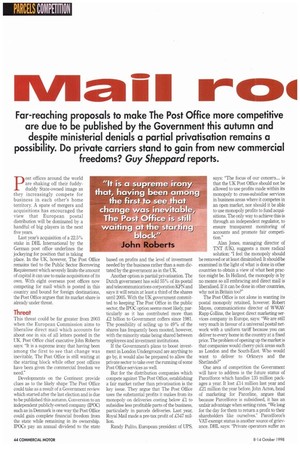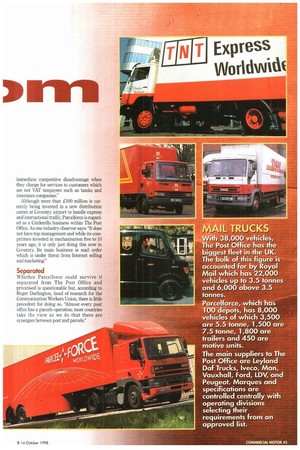Far-reaching proposals to make The Post Office more competitive are
Page 46

Page 47

If you've noticed an error in this article please click here to report it so we can fix it.
due to be published by the Government this autumn and despite ministerial denials a partial privatisation remains a possibility. Do private carriers stand to gain from new commercial freedoms? Guy Sheppard reports.
post offices around the world are shaking off their fuddyduddy State-owned image as they increasingly compete for business in each other's home territory. A spate of mergers and acquisitions has encouraged the view that European postal distribution will be dominated by a handful of big players in the next five years.
Last year's acquisition of a 22.5% stake in DI-IL International by the German post office underlines the jockeying for position that is taking place. In the UK, however, The Post Office remains tied to the Public Sector Borrowing Requirement which severely limits the amount of capital it can use to make acquisitions of its own. With eight overseas post offices now competing for mail which is posted in this country and bound for foreign destinations, the Post Office argues that its market share is already under threat.
Threat
This threat could be far greater from 2003 when the European Commission aims to liberalise direct mail which accounts for about one in six of all letters posted in the UK. Post Office chief executive John Roberts says: "It is a supreme irony that having been among the first to see that change was inevitable. The Post Office is still waiting at the starting block while other post offices have been given the commercial freedom we need."
Developments on the Continent provide clues as to the likely shape The Post Office could take as a result of a Government review which started after the last election and is due to be published this autumn. Conversion to an independent publicly-owned company (IPOC) such as in Denmark is one way the Post Office could gain complete financial freedom from the state while remaining in its ownership. IPOCs pay an annual dividend to the state based on profits and the level of investment needed by the business rather than a sum dictated by the government as in the UK.
Another option is partial privatisation. The Dutch government has sold 55% of its postal and telecommunications corporation KPN and says it will retain at least a third of the shares until 2005. With the UK government committed to keeping The Post Office in the public sector, the IPOC option seems most likely, particularly as it has contributed more than £2 billion to Government coffers since 1981. The possibility of selling up to 49% of the shares has frequently been mooted, however, with the minority stake being shared between employees and investment institutions.
If the Government's plans to boost investment in London Underground are anything to go by, it would also be prepared to allow the private sector to take over the running of some Post Office services as well.
But for the distribution companies which compete against The Post Office, establishing a fair market rather than privatisation is the key issue. They argue that The Post Office uses the substantial profits it makes from its monopoly on deliveries costing below £1 to subsidise less profitable parts of the business, particularly in parcels deliveries. Last year, Royal Mail made a pre-tax profit of £547 million.
Randy Pulito, European president of UPS. says: "The focus of our concern.... is that the UK Post Office should not be allowed to use profits made within its monopoly to cross-subsidise services in business areas where it competes in an open market, nor should it be able to use monopoly profits to fund acquisitions. The only way to achieve this is through an independent regulator, to ensure transparent monitoring of accounts and promote fair competition."
Alan Jones, managing director of TNT (UK), suggests a more radical solution: "I feel the monopoly should be removed or at least diminished. It should be examined in the light of what is done in other countries to obtain a view of what best practice might be. In Holland, the monopoly is by no means so all embracing and direct mail is liberalised. If it can be done in other countries, why not in Britain too?"
The Post Office is not alone in wanting its postal monopoly retained, however. Robert Mayes, communications director of WWAV Rapp Collins, the largest direct marketing services company in Europe, says: "We are still very much in favour of a universal postal network with a uniform tariff because you can deliver to every home in the county at a fixed price. The problem of opening up the market is that companies would cherry-pick areas such as London and the South-East. Who would want to deliver to Orkneys and the Shetlands?"
One area of competition the Government will have to address is the future status of Parcelforce which handles 135 million packages a year. It lost 414 million last year and £21 million the year before. John Acton, head of marketing for Parceline, argues that because Parcelforce is subsidised, it has an unfair advantage when setting rates. We long for the day for them to return a profit to their shareholders like ourselves." Parcelforce's VAT-exempt status is another source of grievance. DM, says: "Private operators suffer an immediate competitive disadvantage when they charge for services to customers which are not VAT taxpayers such as banks and insurance companies."
Although more than £100 million is currently being invested in a new distribution centre at Coventry airport to handle express and international traffic, Parcelforce is regarded as a Cinderella business within The Post Office. As one industry observer says: "It does not have top management and while its competitors invested in mechanisation five to 10 years ago, it is only just doing this now in Coventry. Its main business is mail order which is under threat from Internet selling and marketing."
Separated
Whether Parcelforce could survive if separated from The Post Office and privatised is questionable but, according to Roger Darlington, head of research for the Communication Workers Union, there is little precedent for doing so. "Almost every post office has a parcels operation; most countries take the view as we do that there are synergies between post and parcels."
MAIL TRUCKS
With 38,000 vehicles, The Post Office has the biggest fleet in the UK. The bulk of this figure is accounted for by Royal Mail which has 22,000 vehicles up to 3.5 tonnes and 6,000 above 3.5 tonnes.
Parcelforce, which has 100 depots, has 8,000 vehicles of which 3,500 are 5.5 tonne, 1,500 are 7.5 tonne, 1,800 are trailers and 450 are motive units.
The main suppliers to The Post Office are Leyland Daf Trucks, !veto, Man, Vauxhall, Ford, LDV, and Peugeot. Marques and specifications are controlled centrally with operating divisions selecting their requirements from an approved list.


























































































































